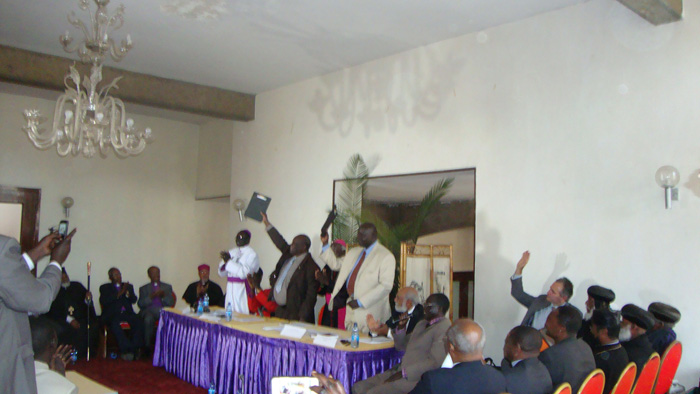After four days of negotiations in Addis Ababa between delegations of the Government of South Sudan and the Cobra Faction of the South Sudan Democratic Movement/ South Sudan Defence Army (SSDM/A) – as the rebels of General David Yau Yau style themselves – agreement has been reached on the modalities of the cease-fire that was proclaimed by President Salva Kiir on 6 January 2014 and accepted by General David Yau Yau. Dutch peace organization PAX has facilitated these negotiations.
The Agreement is the first step towards a more comprehensive agreement that will end the rebellion of David Yau Yau, which began in August 2012. The conflict is centred on the long history of marginalisation of the Murle, Yau Yau’s ethnic constituency. It gained widespread popular support after large-scale government army atrocities during its disarmament of Murle communities in 2012. The number of victims of the fighting is difficult to estimate because the Murle did not bring their wounded to the health posts in the SPLA controlled centres, nor, when these centres were abandoned, to the army helicopters that collected wounded from the battlefield.
In September 2013 the number of registered refugees in Ethiopia, Kenya and Uganda as a result of the insecurity was 17.000, half of them Murle, while there are an estimated 6.000 displaced Murle in Juba. According to counts by OCHA in September 2013, it is estimated that 70.000 people have been directly affected by the fighting. This amounts to half the Murle population. Médecins sans Frontières estimated a year earlier that all Murle were affected. The Murle are the third largest ethnic community in the volatile Jonglei State, squeezed between the Dinka who generally support the government, and the Nuer who now generally support Dr Riek Machar, the deposed vice-president and leader of the forces that had been fighting the government from December 15th until the a Cessation of Hostilities Agreement was signed in Addis Ababa on January 23rd.
Bishops’ initiative
The negotiations between the Government and the SSDM/A led by David Yau Yau began on the day that the Agreement between the Government and the ‘SPLM/A in Opposition’, as the supporters of Riek Machar call themselves, was signed. The two processes are, however, independent. The Intergovernmental Authority on Development (IGAD) is responsible for the negotiations with the ‘SPLM in Opposition’, while the talks with the SSDM/A are an initiative of three South Sudanese bishops of different denominations – Emeritus Bishop Paride Taban, Catholic, Bishop Paul Yugusuk, Episcopal Church of Sudan, and Bishop Arkanjelo Wani, Africa Inland Church. They have taken up this responsibility at the request of the Church Leaders of the Eastern Jonglei Presbytery, the division of the Presbyterian Church to which most Murle Christians belong. The bishops’ initiative commenced in February 2013 and has taken shape in close consultation with PAX (formerly known as IKV Pax Christi), a Dutch peace organization with an office in Juba. In July 2013, the Netherlands Minister of Foreign Trade and Development Cooperation, Lilianne Ploumen, formally requested IKV Pax Christi to provide logistical support and conflict mediation expertise to the church initiative, through the Dutch Embassy in Juba. IKV Pax Christi facilitated an initial meeting in August 2013 – also in Addis Ababa – between representatives of David Yau Yau and the bishops, resulting in a joint commitment to bring about negotiations with the Government. One week later the bishops paid their first visit to General Yau Yau in his headquarters in the Jonglei floodplains.
Paride Taban
Bishop Paride Taban, a long-time partner of IKV Pax Christi, is chairman of the mediation initiative. He is the founder of ‘Holy Trinity Peace Village’, which is located in the middle of cattle raiding communities at the south-eastern edge of Murleland. The United Nations Mission in South Sudan (UNMISS) has given essential support through flying the bishops by helicopter to Yau Yau’s headquarters, which is otherwise inaccessible in the rainy season. Norwegian Church Aid generously assisted the bishops when they were in need of logistical support in December 2013, when the political crisis paralysed normal life in Juba.
In the Agreement of Cessation of Hostilities the parties agree that SSDM/A will remain neutral in the conflict between the Government of South Sudan and the forces loyal to Riek Machar. The area controlled by Yau Yau will be a ‘peace zone’ to which the Sudan Peoples’ Liberation Army (SPLA, the national army) will have access only by mutual agreement. The team monitoring the cessation of hostilities will include SPLA and SSDA members, and representatives of UNMISS and monitors selected by the team of bishops. If any violation of the Agreement is reported, the bishops will be first in line to arrange an amicable solution. The signing ceremony has been witnessed by the Patriarch of the Ethiopian Orthodox Church and by the Catholic Archbishop of Ethiopia.
Hizkias Assefa
The negotiations were moderated by Professor Hizkias Assefa, an Ethiopian mediation expert with a long track record in mediating rebel leaders – most notably John Garang and Riek Machar in 1991, Afonso Dhlakama, Mozambique in 1992, Foday Sankoh, Sierra Leone in 1999, and Joseph Kony, Uganda in 2006. He takes a special interest in working with church leaders and civil society. His main academic work is on the negotiations between the Government of Sudan and the Anyanya rebel movement held in 1972 under the auspices of the World Council of Churches in Addis. Today’s negotiations between the Government of South Sudan and the armed movement of David Yau Yau took place in the same halls where the Addis Ababa Agreement was concluded in 1972.
Agreement on cessation of hostilities between the government of the Republic of South Sudan and the South Sudan Democratic Movement/Defense Army, Cobra Faction




